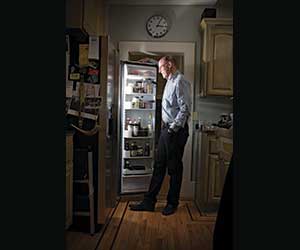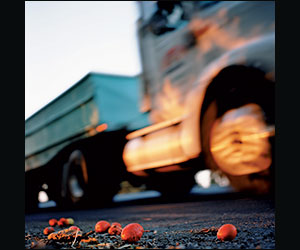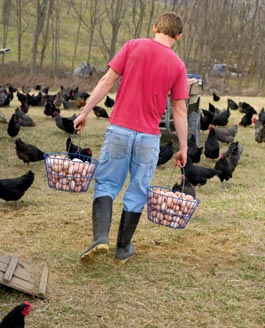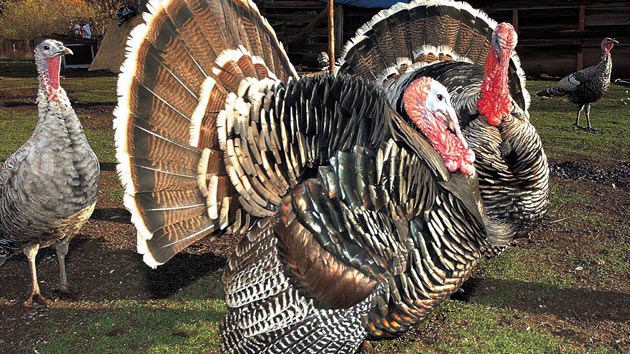
Martin Klimek/Zuma Press
Click here for an expert-led reader forum from April 13-17 on MotherJones.com around the question: Is organic and local so 2008?
Read the extended version of this interview here.
Mother Jones: What surprised you as you researched In Defense of Food?
Michael Pollan: One surprise is how deeply the food system is implicated in climate change. I don’t think that has really been on people’s radar until very recently. Al Gore didn’t talk about it at all; 25 to 33 percent of climate change gases can be traced to the food system. I was also surprised that those diseases that we take for granted as what will kill us—heart disease, cancer, diabetes—were virtually unknown 150 years ago, before we began eating this way.
MJ: When you first wrote the mantra “Eat food. Not too much. Mostly plants,” did you have any idea what kind of reaction you’d get?
MP: Well, I studied my poetry in school, and I knew there was something about the way it sounded that made it easy to remember. After writing The Omnivore’s Dilemma I wanted to write a book that got past the choir, that got to people who didn’t care about how their food was grown, but who did care about their health. I wanted to make it almost billboard simple. It started out as just “Eat food.” But then I realized, Eh, not quite good enough. You’ve got to deal with the quantity issue. And then plants; the more you looked, the more you realized that the shortage of plants in our diet could explain a lot. Not that I’m against meat eating. I think we’re eating too much. That’s why I said “mostly plants.”
MJ: Did you hear from the beef lobby?
MP: No, but there’s another group, the Weston A. Price Foundation, who are fierce in their love of animal fat. And a lot of what they say is right, but they really don’t like plants. People feel like they have to take sides on this plant/animal divide, and I don’t think we do.
MJ: There’s no dilemma?
MP: [Laughs.] No dilemma. And of course a lot of vegetarians were annoyed that I wasn’t saying “all plants.” It’s a thicket. People have strong, quasi-religious views. Secularizing the issue is challenging.
MJ: Your books were once very personal and interior. Has the transition to being the public face of food activism been difficult?
MP: Very hard. You still have to draw lines between being a journalist and an activist. When Obama announced his pick for agriculture secretary I was disappointed, and I said so in some interviews. I got calls from very prominent activists saying, “You should really keep your powder dry because we want to have access to this guy.” Who is this “we”? I felt like Tonto. And I realized that if you are an activist, you do respond tactically. But as a writer you have a pact with your readers that you’ll be really straight with them.
MJ: So what do you think of Iowa governor Tom Vilsack heading Agriculture?
MP: There’s reason to be very concerned. He oversaw a tremendous expansion of feedlot agriculture and confinement hog production, ruining the Iowa countryside, ruining the lives of many farmers. He helped gut local control over the siting decisions. He has also been very friendly toward Monsanto and genetically modified products and was named governor of the year by bio, the big biotech trade organization. But people I respect say that he will listen to food activists and is interested in helping Iowa to feed itself. It’s a food desert, weirdly enough. All the raw material leaves the state and comes back in processed form. Putting the most positive spin I can on it: He’s no longer governor of Iowa, and I’m hoping that as a politician, when he senses where the wind is moving, he’ll move with it.
MJ: How much of our current agricultural policy can we lay at the feet of the Iowa caucuses?
MP: You can’t be elected president without passing though Iowa and bowing down before corn-based ethanol, before agricultural subsidies. I mean, even McCain was a critic of ethanol, but when he got to Iowa he was singing a different tune. But this time around the candidates learned there is a progressive farm lobby. Iowa came close to electing a woman organic farmer as its agriculture secretary—until the Iowa Farm Bureau came after her. And Obama said he saw the importance of local control. That idea that there is a monolithic farm bloc—I wouldn’t say it’s starting to crumble, but there are interesting cracks. The challenge for the food reform movement is to make those cracks bigger.
MJ: Obama has praised corn-based ethanol.
MP: I think we’ll see him back off of that because he’s no longer a senator from Illinois, and he has to look at not only the national but the global implications of this folly. It’s an experiment that’s been disastrous. About 30 percent of the increase in grain prices could be attributed to the decision to embrace biofuels, particularly corn-based ethanol. It has done nothing for climate change, and the business is in real trouble now with the collapse of oil prices. It’s completely dependent on subsidies and tariffs. I don’t think it’s proven itself to be of any value except to Archer Daniels Midland. And Obama appointed Steven Chu as secretary of energy, a fierce critic of corn-based ethanol, a physicist, and a Nobel Prize winner. It will be his job to argue the president and Vilsack out of corn-based ethanol.
MJ: Are all biofuels problematic?
MP: Well, we don’t yet know about cellulosic ethanol. You can’t yet do it economically because it takes a lot of energy to break cellulose down. And the kind of refineries that we’ve been building for corn will not work for cellulose. When you use farms to create fuel, you’re going to have to replace that acre of farmland. So people deforest Indonesia, Brazil. It’s very shortsighted and based on the fact that oil companies need a replacement liquid. It’s what they’re good at. And they have gas stations. And the idea that maybe the best way is a sustainably powered electrical grid that we all plug into doesn’t sit well with oil companies; they don’t have a seat at that table. That’s why BP has given half a billion dollars to Berkeley to help develop cellulosic ethanol. I think that Obama will put a lot of money into it to help develop it. I just hope it’s not wasted.
MJ: Ethanol producers have asked for part of the economic stimulus/bailout package.
MP: Can you believe it? They’re only, like, two years old and they were started with subsidies and would not exist except for the fact that in 2006 President Bush began these mandates. Now, on top of that, they need a bailout.
MJ: If you had a magic wand, would you get rid of subsidies or reform them?
MP: I’d give farmers the exact same amount of money to do something else. It’s a dead end to try and eliminate subsidies, because then you get all of America’s farmers, who have political power out of all proportion of their number, unified against change. Right now the incentives are to produce as much as possible, whatever the costs to the environment and our health. But you can imagine another set of assumptions, so that they’re getting incentives to sequester carbon. Or clean the water that leaves their farm, or for the quality, not the quantity, of the food they’re growing.
MJ: Why is having a secretary of agriculture from an urban community, where the majority of eaters live, such an impossibility?
MP: Good question. For many, many years the interests of farmers and eaters were the same thing. When the great public health problem was not enough calories for everybody, having policies that encouraged farmers to produce as much as possible made sense. Now our problem is different; it is the poor who suffer disproportionately from diet-related illnesses and chronic diseases. So merely giving them enough calories is not the answer. One of the more encouraging things that Vilsack said was that he was going to put nutrition at the center of his nutrition programs, which must have struck a lot of listeners as, “Well, duh,” but in fact nutrition has not been at the center; disposing of agricultural surplus has been. One thing to consider is getting these programs out of the Department of Agriculture. Eaters are the biggest interest group of all, and their interests are not being taken into account.
MJ: The food activism community is criticized as being elitist, blind to the issues of cost. How do we democratize better quality?
MP: It is the important question. One of the problems is that the government supports unhealthy food and does very little to support healthy food. I mean, we subsidize high fructose corn syrup. We subsidize hydrogenated corn oil. We do not subsidize organic food. We subsidize four crops that are the building blocks of fast food. And you also have to work on access. We have food deserts in our cities. We know that the distance you live from a supplier of fresh produce is one of the best predictors of your health. And in the inner city, people don’t have grocery stores. So we have to figure out a way of getting supermarkets and farmers markets into the inner cities.
MJ: By mandates?
MP: When we give people on the wic [Women, Infants, and Children] program or food stamps farmers market vouchers, lo and behold, the farmers markets show up in those neighborhoods. That said, one of the best things that Obama could do would be build 12-month farmers markets, especially in inner cities, those beautiful glass buildings you see in Barcelona or Reading Terminal Market in Philadelphia. It would drive economic development and local agriculture.
The other way that you democratize the food movement is pay enough for the school lunch system to buy local food, fresh food, because right now it’s all frozen and processed. You will improve the health of the students and the local economy. Supposedly it would take about a dollar per student per day.
MJ: Does wic still specify that you buy dairy?
MP: Yes. We had a huge fight to get a little more produce in the wic basket, which is heavy on cheese and milk because the dairy lobby is very powerful. So they fought and they fought and they fought, and they got a bunch of carrots in there. [Laughs.]
MJ: Specifically? Who knew: the carrot lobby?
MP: Specifically carrots. The next big lobby. But there is also money in this farm bill for fresh produce in school lunch. The price of getting the subsidies was getting the California delegation on board, and their price was $2 billon for what are called specialty crops—fresh fruit and produce grown largely in California.
MJ: Should we be trying to go as quickly as possible toward organic and local, or can the perfect be the enemy of the good?
MP: That’s why I don’t know if organic is the last word. It’s sort of an all-or-nothing idea. People getting it partly right is very important. Getting your chickens out of those cages is important, even if you’re not getting them organic feed. Those will not be organic eggs, but they will be so far superior. There are many varieties of sustainable agriculture we should support; it doesn’t have to be a zero-sum game. Let a thousand flowers bloom, and let’s see what works. The whole problem of industrial agriculture is putting all of your eggs in one basket. We need to diversify our food chains as well as our fields so that when some of them fail, we can still eat.
















